People
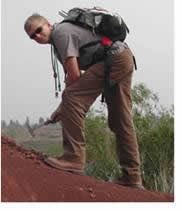 Gabe Bowen
Gabe Bowen
email
personal page
bio
As a native of Michiganís Peninsula and graduate of the University of Michigan (B.S. in Geology, 1999), returning to the Midwest after completing a Ph.D. (Univ. of California, Santa Cruz, Earth Sciences, 2003) and postdoc (University of Utah, Dept. of Biology, 2004-2005) in the western half of the United States has been something of a homecoming. I do miss the rocks, deserts, and mountains, though. So I feel fortunate to work in a field that allows me to stay in touch with these places and at the same time get to know more about the landscapes and ecosystems of my new home state!
As my list of previous affiliations implies, my research interests span the fields of biology and geology, and this is reflected in the ongoing and developing research projects in my group at Purdue. In short, I am interested in humankindís impact on Earthís environment, particularly those that promise to have immediate and important consequences for our continued survival and comfort as Earth-dwellers. The wide-ranging, large-scale changes we are causing in the global water cycle represent one such set of impacts, and have developed as a central theme in many of my research projects. This work focuses on (1) understanding natural environmental change, through study of the geological record, as a baseline or analogue for human-induced changes, and (2) observation and modeling of the current state of the environment and changes therein. Members of my lab group apply a range of tools in our research, the primary ones being light stable isotope ratio analysis, geochemical modeling, and GIS.
[Gabe’s CV]
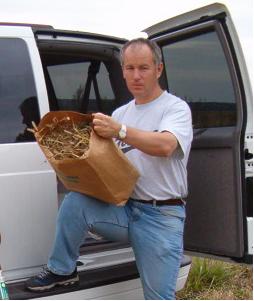 Sergey Oleynik
Sergey Oleynik
(PSI Lab Manager)
email
bio
Since his beginnings Sergey has been fascinated by the mechanical workings of things surrounding him - clocks, toys, pianos… His desire to know how the world is constructed brought him to the Russian chemical-technological university in Moscow, where he discovered the amazing power of the mass spectrometer to investigate the world. Sergey obtained his PhD from the greatest Russian university - Moscow State University, and has been working in mass spectrometry for more then 25 years. His scientific interests are wide and are united by the use of stable isotopes as markers of natural processes.
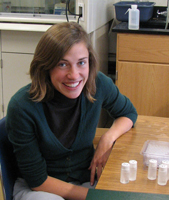 Hilary Schafer
Hilary Schafer
(Head Technician)
email
bio
Hilary Schafer is a graduate student at Purdue University, working towards a Masters Degree in Speech Language Pathology. She received her B.A degree in Philosophy from Christendom College in Front Royal, VA. Although she was new to the whole Ďisotopeí thing when she started, Hilary has quickly assimilated lab know-how and is now the go-to person for keeping the lab running smoothly and the mass spectrometer fed with samples.
Postdocs
 Casey Kennedy
Casey Kennedy
email
personal page
bio
Casey received a B.S. in Geology from Guilford College and both an M.S. and a Ph.D. in Hydrology from North Carolina State University. His primary research interests are in chemical/isotope hydrology, nitrogen cycling in groundwater, and groundwater-surface water interaction. A central theme of his research has been the application of environmental tracers (e.g., 14C, δ13C, δ18O, d2H, 3H, He, Ar, N2, and CFCs) to assess the quality and sustainability of water resources. His Ph.D. research dealt with quantifying the spatial and temporal dynamics of water and nitrogen fluxes through a streambed in an agricultural watershed. At Purdue, his research focuses on characterizing the geographic and seasonal variations in stable hydrogen and oxygen isotopes of water.
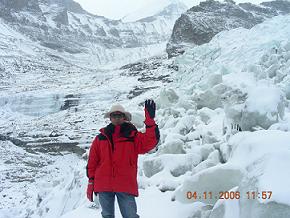 Zhongfang Liu
Zhongfang Liu
email
bio
Zhongfang is a postdoctoral associate in the Department of Earth and Atmospheric Sciences at Purdue University. He received his M.S. in Physical Geography from Shanxi Normal University, and his Ph.D. in Physical Geography from the Institute of Tibetan Plateau Research of the Chinese Academy Sciences. He is interested in stable isotope variations in the hydrological cycle. During his Ph.D. research, he worked on understanding the climatic controls on stable isotope variations in precipitation and surface water over the Tibetan Plateau. His current research focuses on developing and applying models for the spatial analysis of water isotope data.
 Jeremy Stalker
Jeremy Stalker
email
bio
Jeremy comes to us most recently as a Visiting Assistant professor at the University of Montana in Missoula. Jeremy received his B.S. in Geology at Michigan State University, a Masterís degree in Geophysics at the University of Montana, and then a Ph.D. in Geochemistry at Florida International University in Miami, FL. In between these degrees he worked as a hydrologist for the USGS in New York, and as an exploration Geophysicist in Ketchikan Alaska. His research has included applied geophysical investigations of basin scale sedimentation and saltwater intrusion on tropical coastlines, but his primary research focuses on using geochemical tracers such as light and heavy stable isotopes (O, H, N, C, He, and Sr), radioisotopes (Ra, 3H, Rn) as well as dissolved metals in hydrological applications. His hydrologic work has included tracing fresh and saline water sources in Biscayne Bay in south Florida and the Everglades, the Bahamas, and in the Yucatan peninsula of Mexico in an effort to elucidate source waters, pathways, residence times, and to help understand potential anthropogenic impacts to these hydrologic systems. His research at Purdue will focus on tracing water sources in arid regions with varying levels of human impacts to the natural hydrologic system using light stable isotopes as tracers. When he is not chasing water with a peristaltic pump he is chasing it with a sea kayak, SCUBA gear, or in frozen form with a pair of crampons and axes or Tele-skis while logging more nights in hotel Ford.
Graduate Students
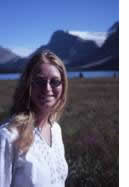 Kristine Nielson
Kristine Nielson
email
bio
Kristine is a graduate student in the Earth and Atmospheric sciences department at Purdue University . She recieved a B.S. in Geology from Caltech and an M.S. in Geology from Penn State. Her master's research, conducted with Kate Freeman and Chuck Fisher, focused on the sulfur stable isotope geochemistry and lipid geochemistry of sediments associated with vestimentiferan tubeworms in the Gulf of Mexico . She is currently working on paleoclimate reconstruction of the Great Salt Lake and is especially interested in molecular biomarkers and their use as proxies for environmental variables like temperature, salinity, and precipitation.
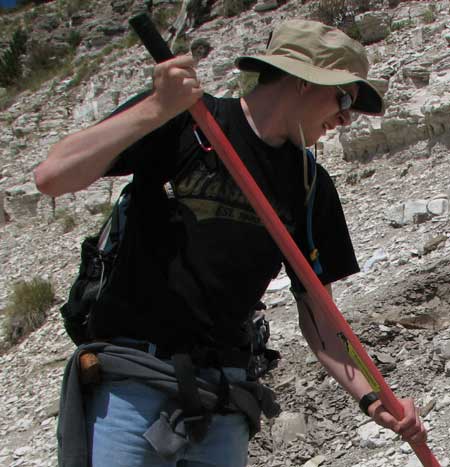 Justin VanDeVelde
Justin VanDeVelde
email
bio
Justin is a graduate student at Purdue University in the Earth and Atmospheric Sciences Department, studying towards an Ph.D. degree. He received a B.S. in geology from the University of Nebraska - Lincoln. He is especially interested in the use of stable isotopes as proxies in climate and ecological reconstructions, and is currently working on multi-substrate paleoenvironmental reconstruction in the Lake Flagstaff paleo-basin of central Utah.
 Clement Bataille
Clement Bataille
email
bio
Clement is a graduate student at Purdue University in the Earth and Atmospheric Sciences Department, studying towards an Ph.D. degree. He received a B.S. in agronomy and a M.S in hydrology/hydrochemistry from the Institut National Polytechnique - Toulouse . He is especially interested in the use of stable isotopes as proxies in climate and ecological reconstructions, and is currently working on paleoenvironemental reconstruction in the Bighorn Basin.
Undergraduates
Derek Bessler
Derek is a senior in the College of Engineering. He has worked as a technical support staff member for the PSI lab and IREH group since 2007
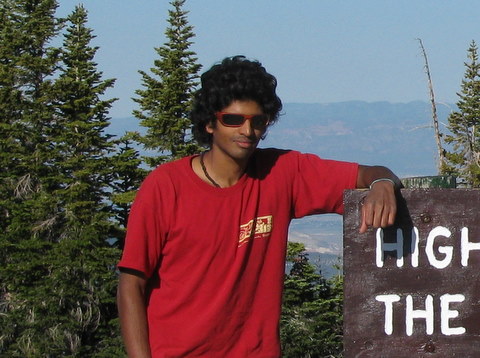 Vishnu Srinivasaraghavan
Vishnu Srinivasaraghavan
email
bio
Vishnu Srinivasaraghavan is a junior in the undergraduate geology program. He has gained quite an interest in paleoclimate research and has been working with carbonate isotope analysis in the lab since spring, 2010. Most recently he had the opportunity spend a month in the field with Justin and Clement in Wyoming and Utah. He is working on a project to assess controls of isotopic variability within Eocene paleosols in northern Wyoming, and hopes to use his research experience to further his exploration of paleoclimate and other areas in geology before he graduates.
Former IREH lab personnel
Aya Schneider-Mor (postdoc 2007-2009)
Current position: Postdoc, Stanford University

Gabe Bowen
Sergey Oleynik
Hilary Schafer
Casey Kennedy
 Zhongfang Liu
Zhongfang Liu Jeremy Stalker
Jeremy Stalker

 Clement Bataille
Clement Bataille Vishnu Srinivasaraghavan
Vishnu Srinivasaraghavan